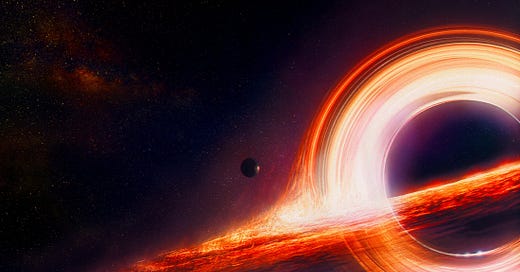Black holes are not actually holes, nor do they only pull matter into them as commonly believed. But do they destroy information? Black holes are the perfect embodiment of the word mystery—perhaps they should be defined as enigmas. Contrary to popular belief, black holes are not eternal prisons, though they may seem so. When venturing into black holes, one must be prepared to face the perplexing consequences of these enigmatic voids.
[3]
Black holes were once thought impossible, but they are real. We first imagined them through the lens of General Relativity (our best theory of gravity) and later observed them through the telescopes of the Event Horizon Telescope program. Black holes form as a result of the death of a massive star. In theory, any amount of mass can form a black hole if compressed into a sufficiently small volume, creating an extremely high density [2]. This critical size is known as the Schwarzschild radius, calculated using the formula:
[4]
If an object's mass is confined within its Schwarzschild radius, it will form a black hole. Not even light can escape if an object is smaller than this radius, resulting in the black appearance—not prisons of space, but of time.
The idea of such objects predates Einstein. The mathematician Pierre-Simon Laplace theorised about a body with an escape velocity exceeding the speed of light. Einstein later showed that time appears to stop at the event horizon. Light cannot escape the event horizon because the escape velocity exceeds the speed of light. Since the event horizon is a notional boundary rather than a physical surface, photons will either fall into it or escape.
[5]
Imagine a spaceship approaching a black hole; an outside observer would never see it cross the event horizon—it would seem to fade away. However, from the spaceship's perspective, it would cross the horizon while the outside universe fades. This suggests that black holes are eternal since time appears to slow down indefinitely at the event horizon from an inertial frame of reference outside the influence of the black hole's gravitational field strength.
"Singularity is not a point in space, but a point in time [...] Black holes distort the space-time continuum in such a way that their roles swap." — Prof. Brian Cox
Initially, black holes seemed eternal until a breakthrough in quantum mechanics by Prof. Stephen Hawking, who discovered Hawking radiation. Near a black hole, a pair of virtual particles—a particle and its antiparticle—can exist [1]. One may fall into the black hole, leaving the other without its pair. Quantum fields in spacetime can create pairs of virtual particles, and the remaining particle can escape as Hawking radiation, taking energy from the black hole. Over time, the black hole will lose energy and eventually evaporate.
While black holes are not eternal prisons due to Hawking radiation, they remain prisons of time.
Sources cited:
Gunn, Alastair. “What Is Hawking Radiation?” BBC Science Focus Magazine, www.sciencefocus.com/space/what-is-hawking-radiation
Book reference: (Edward Cox, Brian. Black Holes - The key to understanding the universe, Boston city, Mariner Books, 6 October 2022)
Image: https://en.wikipedia.org/wiki/Black_hole#/media/File:Black_hole_-_Messier_87_crop_max_res.jpg
Image: https://perthobservatory.com.au/space-and-astronomy/the-schwarzschild-radius#schwarzschild-radius-2
Image: Veritasium. “Something Strange Happens When You Follow Einstein’s Math.” YouTube, 30 Apr. 2024, www.youtube.com/watch?v=6akmv1bsz1M
[Timestamp: 17:03]






